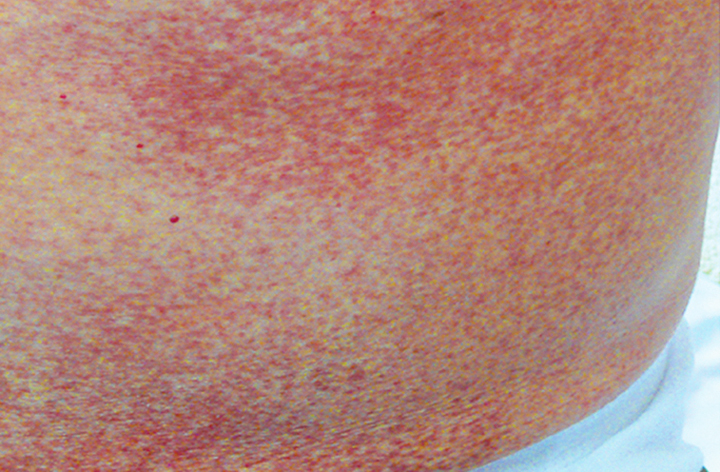Systemic mastocytosis is a rare blood disorder. It happens when your body makes abnormal mast cells that multiply. Mast cells defend against intruders like allergens. In systemic mastocytosis, abnormal mast cells set up a continuous allergic response. The cells also multiply uncontrollably, affecting your skin and internal organs.
Advertisement
Cleveland Clinic is a non-profit academic medical center. Advertising on our site helps support our mission. We do not endorse non-Cleveland Clinic products or services. Policy

Image content: This image is available to view online.
View image online (https://my.clevelandclinic.org/-/scassets/Images/org/health/articles/24386-systemic-mastocytosis)
Systemic mastocytosis is a type of mastocytosis — a rare blood disorder that happens when your body makes abnormal mast cells. Mast cells are a type of white blood cell and part of your immune system.
Advertisement
Cleveland Clinic is a non-profit academic medical center. Advertising on our site helps support our mission. We do not endorse non-Cleveland Clinic products or services. Policy
When mast cells detect intruders, they release histamine. Histamine sets off an allergic response. Normally, mast cells stop releasing histamine when their job is done. But in systemic mastocytosis, large numbers of abnormal mast cells continue to release histamine long after they should. This chemical overload causes a continuous allergic response that can affect your skin and internal organs.
Systemic mastocytosis is rare. It affects about 13 out of every 100,000 people worldwide.
People with systemic mastocytosis have a higher risk of anaphylaxis (a severe, life-threatening allergic reaction). Rarely, systemic mastocytosis can become cancer.
Healthcare providers can’t cure the condition. But treatment can ease your symptoms.
Video content: This video is available to watch online.
View video online (https://cdnapisec.kaltura.com/p/2207941/sp/220794100/playManifest/entryId/1_kj259gdi/flavorId/1_5f3sgelj/format/url/protocol/https/a.mp4)
Learn how each different phase can impact your life.
There are six types of systemic mastocytosis. Each can affect you in different ways. In general, the more abnormal mast cells you have, the greater the chance you’ll have complications.
These types include:
Advertisement
Symptoms vary depending on where the abnormal mast cells gather. For example, if you have too many mast cells in your stomach, you might develop ulcers and belly pain. In the same way, abnormal mast cells that build up in your bone marrow may affect blood cell production.
Systemic mastocytosis symptoms may include:
People with systemic mastocytosis may suddenly develop several symptoms all at once. Healthcare providers may refer to this as a mastocytosis attack or flare.
Having these symptoms doesn’t necessarily mean you have systemic mastocytosis. But if you have several of these symptoms at the same time and they don’t go away, talk to a healthcare provider.
Research shows about 80% of people with systemic mastocytosis have a KIT gene variant (change). KIT genes play a role in developing certain cell types, including blood cells and mast cells. The gene change happens after conception and isn’t hereditary.
Many things can trigger systemic mastocytosis. Not everyone with the condition reacts to the same triggers, but common ones include:
Ask your healthcare provider which triggers you should avoid.
A healthcare provider will start with a physical exam. They’ll ask about your symptoms and medical history.
They may also run one or more of the following tests to diagnose or rule out systemic mastocytosis:
Healthcare providers treat systemic mastocytosis by managing symptoms and complications. For example, if you have excess stomach acid, they may prescribe H2 blockers (antacids). If the condition causes anemia, they’ll treat the anemia.
Systemic mastocytosis treatments may include:
Advertisement
If you have systemic mastocytosis, you should always carry an EpiPen®. Epinephrine treats anaphylactic shock, a severe, life-threatening allergic reaction.
There’s no cure for systemic mastocytosis. But healthcare providers have treatment strategies to manage symptoms and complications.
A bone marrow transplant can permanently get rid of systemic mastocytosis. But healthcare providers reserve this treatment for those with the most aggressive forms of the condition.
That depends on the condition type. People with indolent systemic mastocytosis can usually manage their condition with treatment. They have a typical life expectancy. Those with more aggressive types may have shorter lifespans.
Systemic mastocytosis happens when you have the genetic change that causes it. That means you can’t prevent it. But you can reduce your risk for attacks or flares by avoiding triggers.
Knowing how to avoid triggers is a big part of living with systemic mastocytosis. If you have this condition, you should:
Advertisement
You’ll see your healthcare provider for regular check-ups. Be sure to tell them whenever you notice new or worsening symptoms.
Systemic mastocytosis is rare. Here are some questions you might want to ask your healthcare provider:
Systemic mastocytosis is a life-changing diagnosis. It means you’ll visit your healthcare provider often. Blood tests will become routine. You’ll also need to identify triggers and try to avoid them. Living with this condition is a big adjustment. Lean on your healthcare provider. They’re here to help. They can point you to resources and support groups that can empower you to take control of your health.
Advertisement
Learn more about the Health Library and our editorial process.
Cleveland Clinic's health articles are based on evidence-backed information and review by medical professionals to ensure accuracy, reliability, and up-to-date clinical standards.
Cleveland Clinic's health articles are based on evidence-backed information and review by medical professionals to ensure accuracy, reliability, and up-to-date clinical standards.
When you have systemic mastocytosis, your allergic reactions never stop. Cleveland Clinic can help you manage that with personalized treatment.
